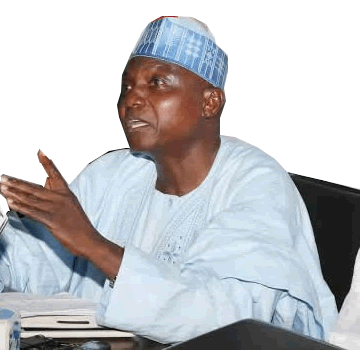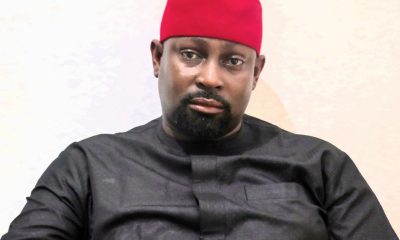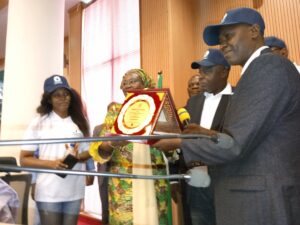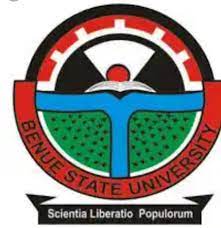COLUMNISTS
Buhari, Amaechi and a Regime of Contractual Impunity
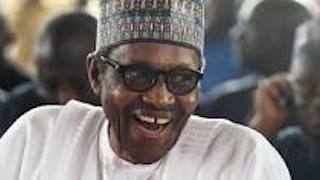
By Odunayo Ajala
As I sit to write this piece, a wave of indignation is sweeping over me. As a stakeholder in the Nigerian project and a citizen concerned about the future of the country, I am miffed by the failure of the President Muhammadu Buhari-led administration that prides itself as an anti-corruption, equity, and transparency brand to move from just barking to biting at one of the powerful ministers of the administration, Rotimi Amaechi, despite reports of his acts that fly in the face of probity.
If what one has read in the newspapers over the past couple of months is anything to go by, Amaechi has on two occasions recently misled Buhari into taking decisions that do not just rob the country of millions of dollars in revenue, but also impacted negatively on the image of the country.
Apart from causing the country to lose millions of dollars and embarrassingly misleading or deliberately hoodwinking the president on key and strategic contracts, Amaechi has also serially violated his oath of office with impunity, which is suggestive of an “untouchable or sacred cow”. That anyone would consider himself to be a sacred cow or be treated as such by the Buhari administration is in fact an incredulous irony, but this is what Nigeria seems to be grappling.The first indication of an Amaechigate is the multi-billion naira International Cargo Tracking Note for Nigeria (ICTN) allegedly fraudulently conceived by the minister. The International Cargo Tracking Note (ICTN) scheme is an electronic cargo verification system that monitors the shipment of seaborne cargo and enables a real-time generation of vital data on ship and cargo traffic in and out of Nigeria.
This contract is now a subject of litigation at an Abuja court. According to a December 22, 2021 report in PUNCH newspaper, a Federal High Court sitting in Abuja had restrained Amaechi, other agents and agencies of the Federal Government from taking any further step towards nominating any company or entity to be operators of the ICTN.
This is part of the details of a painfully uncomplimentary report published by Premium Times on November 1, 2021. Titled “Buhari, Amaechi illegally award multi-billion maritime contract to medical company,” Premium Times told the whole world that the president and his minister committed illegalities by awarding contracts without due process to a non-qualified company.
The report said: “President Muhammadu Buhari and the Minister of Transportation, Rotimi Amaechi, have approved a huge national security-sensitive maritime contract to a medical company in a process the Bureau of Public Procurement (BPP) says is “embarrassing” and illegal…The development has unsettled the Buhari government, with senior officials sparring and trading accusations of bad faith and the BPP complaining of “procedural lapses” in carefully worded memos that only stopped short of directly accusing Mr Buhari and Mr Amaechi of lawlessness…The procurement agency said the contract was awarded in clear breach of the Public Procurement Act 2007.”
The report, to which the minister has not given any denial, at least not to my knowledge, suggested that he deliberately hoodwinked the president into approving this illegal deal.
The Premium Times report said further: “…In what kickstarted the current process that is now stuck in controversy and abuse, Mr Amaechi’s transport ministry, on September 11, 2020, sought the approval of the BPP to conduct a restricted/selected tendering exercise to engage agents or partners for the implementation of the cargo tracking note scheme… But citing the “convoluted” circumstance of the initial contract, which attracted criminal investigation by the EFCC and the need to regain international confidence, the BPP rejected the selective tender request and, instead, asked the transport ministry to conduct international competitive bidding (ICB).”
Premium Times reported that the BPP explained in its October 22, 2020 correspondence with Amaechi that the ICB was to ensure that reputable international firms with requisite experience and capacity to deliver on the job participate in the procurement process. Nevertheless, the Amaechi defied this advice and went ahead with his plans! The Premium Times report alleged that: “But surprisingly,” the BPP noted in a memo that the transport ministry on August 26, 2021, reverted to the public procurement regulator with an approval dated August 19, 2021, from the president to adopt a direct procurement in favour of MedTech Scientific Limited, a healthcare company, in partnership with Rozi International Nigeria Limited, a property development company.”
Given the impunity, including wrongfully obtaining presidential assent and sidestepping laid down procedures to award the contract to a non-qualified company, the BPP was said to have expressed concern at the embarrassment that the situation would have brought to the office of the president. The Premium Times report said: “Despite the arbitrariness of the procurement process, the BPP said it could not stop Mr Amaechi since he had managed to gain Mr Buhari’s anticipatory approval. An anticipatory approval means the granting of a procurement request before the statutory consideration and endorsement of the Federal Executive Council….Nevertheless, the BPP separately told Mr Buhari’s Chief of Staff, Mr Gambari, and the Ministry of Transport that “it is not correct” for the “exalted Office of His Excellency, Mr President, to be drawn into routine administrative approvals particularly contract-related matters that are open to litigation. This procedure should be strongly discouraged…”
It is shocking, therefore, that the same president, whose embarrassment the BPP was trying to prevent doesn’t even think anything of it. Unfortunately, this is not just about the president and Amaechi. The tragedy is that it also tells a lot about how seriously Nigerians and non-Nigerians should take the so-called anti-corruption war of the president. If a man engages in blatant acts of impunity, which rub off on the country’s image and rob it of revenues in hundreds of millions of naira and repeatedly, without even as much as a manifestable slap on the wrist, then something is wrong. It is pathetic that an example of the country’s sense of seriousness cannot be made with a man who drags the country and its leader into such situation.
Amaechi’s misuse of whatever privileges he might have with the president gets even more flagrant with a newspaper report last week. On January 11, ThisDay published a story with the title: “Buhari Cancels Restoration of INTELS’ Pilotage Contract.”
In this front-page report, it was alleged that the president had ordered the reversal of his earlier instructions on the restoration of some contracts to INTELS, a logistics services provider in the maritime, oil and gas sectors. It is a company reportedly co-founded by Gabriele Volpi, an Italian national, and Alhaji Atiku Abubakar, Nigeria’s former vice president. And it has continued to be in the news for the wrong reasons over the past couple of years.
On June 16, 2021, the chairman of the Economic and Financial Crimes Commission (EFCC), Abdulrasheed Bawa, said the Commission was able to recover the sum of $100 million out of the Federal Government’s revenue, which INTELS received on behalf of the Nigerian Ports Authority (NPA) but withheld until the intervention of the EFCC. This intervention arose after the management of the NPA sought EFCC’s assistance in the recovery of monies, which INTELS refused to remit into the Treasury Single Account (TSA) and retained in its coffers.
Reports indicate that this contract expired in August 2020, yet Minister Amaechi had the mind to misadvise President Buhari into restoring an expired and inexistent contract and then stall an ongoing legally instituted procurement process! Are we in a banana republic? This is the same company that is said to receive a whooping and unheard of 28 per cent commission on the boat pilotage contract it maintained with the NPA. Yet, a minister who should protect the interest of Nigerians wants the exploitation to continue!
According to the ThisDay report, “The Nigerian Ports Authority insisted that the 10 years contract with INTELS expired on August 8, 2020, after which it initiated procurement processes for the contract. The NPA thereafter submitted the outcome of the procurement process, which the Authority says INTELS participated in, to the Minister who, rather than forward same to BPP, sought the approval of the President to restore the contract to INTELS. This situation has brought the boat pilotage service operations to a standstill for about 16 months, with attendant revenue losses to the nation.” This indicates that the minister’s failure to follow due process led the president into taking a costly decision that he has now had reversed when he got the right facts. Unfortunately, this was after the country had lost millions of dollars and reputational damage.
Quoting an advice said to have been sent to the president by the Bureau of Public Procurement, ThisDay wrote: “In the same vein, the BPP denounced claims by the Ministry of Transportation and urged the president not to restore the contract to avoid further litigation. The BPP in a letter addressed to the COS to the president, with reference, BPP/DG/2021/007, dated March 9, 2021, had stated that the decision by the NPA to initiate a procurement process in anticipation of the expiration of the contract for boat pilotage operation managing agent was in order.
“The BPP in the letter signed by its Director General, Mamman Ahmadu, concluded that, ‘There is a compelling need to ensure that contractors and service providers do not take undue advantage of government agencies and do not obtain contracts from government agencies through the court rooms. The correct procedure is that contracts should be won through a proper procurement process that complies with the provisions of the PPA, 2007. Furthermore, there is need to avoid the kind of monopoly currently enjoyed by Messrs INTELS which has cascaded into entitlement mentality being demonstrated by the firm. Also, monopoly will inevitably result in charging a higher price to the consumer/client than what is obtainable from a competitive market, thereby eroding value for money.” This is the situation, which Amaechi has encouraged by advising the president to approve the restoration of the INTELS’ contract according to approval said to have been given by the president in January 2021. Now, according to ThisDay, that the Attorney General of the Federation (AGF) and the BPP have shown Buhari the light, revenues have been lost and Nigeria has given itself away as a country of flipflops. How so?
One year after the president was misled into directing the restoration of the contract, he signed another correspondence counter-directing that the procurement process initiated by the NPA, that was submitted to, but allegedly withheld by the Ministry of Transportation, should be forwarded immediately to the Bureau of Public Procurement (BPP) for evaluation and necessary action. The minister was also directed to see that the process is concluded within 60 days of Mr President’s directive to avoid further loss of revenue by the Federal Government.
This becomes expedient as the AGF was said to have noted that the situation foisted on the country by Amaechi had created a vacuum in the provision of this critical service in the maritime sector, with its attendant loss of revenue from service boat operations to the Federal Government. Yet, Amaechi still gallivants around as a power broker in the administration. He is even said to be aspiring for Nigeria’s presidency next year. You can only just imagine what someone who behaves like this as minister will do as president! May God forbid that prospect.
Given the finality of a presidential instruction reported to have been directed at the minister earlier this month, a serious nation should be demanding the querying, if not outright removal of the former governor of Rivers State from office as Minister of Transportation. But this is Nigeria, where certain men feel like they own the country. But ordinary Nigerians like me, who queued up in the sun to vote for Buhari in 2015 and gave him a second term in 2019, anticipated a Nigeria where people who subject national interest to any other consideration are made to pay for it. This is not what we are seeing in these cases about Amaechi, and it is heart-breaking! One still hopes though, that the president will act.
Odunayo Ajala, a forensic marine expert, writes from Lagos.
COLUMNISTS
The Emefiele Mess and Rivers State’s Comedy of Errors
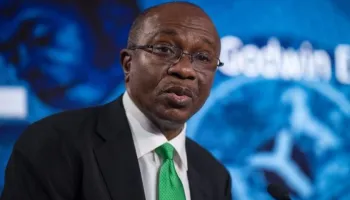
By Zainab Suleiman Okino
The former Governor of Central Bank of Nigeria, Godwin Emefiele finally got a respite last Friday when he was released from Kuje prison after meeting his bail conditions, but not before his alleged atrocious and unfathomable heists were made public, to his eternal disgrace.
Emefiele was arrested by the Tinubu-led government and spent 195 days in detention, while investigations into his tenure at the apex bank were ongoing.
Although the media decried his and the former EFCC chairman, Abdulrasheed Bawa’s long detentions without trial, in line with the country’s laws, by the time his trial commenced, it had become obvious that we had a juvenile-like man in charge of the trillion-dollar economy of Nigeria.It is therefore not a surprise that the economy also collapsed and all he could do was to encourage a figure-head President Buhari to borrow and borrow more.
Back to the shocking revelations shaking the fabric of the Nigeria society, Emefiele, according to the special investigator, Jim Obazee, operated 593 illegal US, UK, and China accounts and diverted £543,482, 213 into UK banks alone, in addition to his trial over N1.2 billion procurement frauds.
There are also allegations that Emefiele sold or “gave away” Union Bank, Keystone Bank and Polaris Bank to proxies and cronies in the guise of being special purpose vehicles (SPVs) for acquisition after CBN’s no objection report, which he had orchestrated.
Emefiele’s sins are many and the coming days will reveal the Tinubu-led government’s readiness to handle corruption-related issues concerning the ex-CBN governor, other key players in the previous administration, and anybody for that matter, and that includes those associated with him.
Emefiele, fresh out of prison, has sought for the further investigation of the shady deals he was accused of, while claiming that the accusations against him “are false, misleading and calculated to disparage my person and injure my character.” I hope so too and wish Emefiele good luck, because only a person with mental disorder would commit such malfeasances and hope not to be held accountable for them.
By far, the most damaging of Emefiele’s obnoxious policies was that of the naira redesign, which assumed a political dimension allegedly to stop Tinubu from emerging as president, but nonetheless had devastating consequences on ordinary Nigerians, leading to deaths and the crippling of people’s finances.
To think that the idea emanated from a former presidential aide and relation of President Muhammadu Buhari, is to take Emefiele’s loyalty to the Buhari cabal to a ridiculous extent. What exactly did Emefiele want? As a former MD/CEO of Zenith Bank before his appointment to the apex bank by ex-President Goodluck Jonathan, he should have felt accomplished enough not to allow his ambition, greed, and pressures from the cabal (no matter how powerful they are) to sway him towards unethical deeds, with far-reaching consequences on his reputation.
Again, Emefiele is fighting back, claiming he had presidential approval for the naira redesign, and that he neither operated 596 accounts, nor withdrew $6.23 million alongside former SGF Boss Mustapha. Whatever!
He was perceived as having his two hands in the national cookie jar, while the Nigerian people reeled in poverty. His disastrous political voyage did not help matters. Emefiele’s alleged financial sleaze and fleecing of the country was unprecedented and the most brazen in recent times.
But instead of being cautioned, he was encouraged by other officials of the Buhari government in an unholy alliance that only the ex-CBN governor is now paying for. With his experience in one of the biggest banks in the country, why he allowed non-professionals in government to drag him into the pit is incomprehensible.
Does it really mean there is no limit to the official corruption of top government functionaries or because the Nigerian public also condones it and collects peanuts to become their cheerleaders? So, the joke is on us as a people, if there are no mechanisms to stop financial recklessness in high places before they get to an outrageous level like that of Emefiele.
Running for the office of the president was Emefiele’s greatest undoing and the height of impunity. For this brazen arrogance, it was obvious that losing out would also lead to his waterloo. Was becoming president calculated to protect his loot and turf? To whose detriment? To prove his immunity from prosecution or that he was untouchable? If he had transmuted to the president of Nigeria, he would have made history, running for election as a sitting CBN governor, when he was supposed to be non-partisan.
That thoughtless action would have finally nailed Nigeria as a banana Republic, with far-reaching implications for the country’s image and its people. It would have also meant the diminished integrity of the country’s number one financial institution, which would have become a cash cow for his relentless financial laundering; another form of state capture, whereby corporate governance, leadership capability and personal morals are near zero. Surely Emefiele needs to do a lot to clear his name and extricate himself from the rot that happened under his leadership.
Rivers State Comedy of Errors
When last week President Bola Tinubu invited the warring personalities in the Rivers State political crisis – Governor Siminalayi Fubura and ex-governor and Minister of the FCT, Nyesom Wike – to the Presidential Villa for a truce, little did we know that instead of a thaw, the crisis would spiral into ridiculous confusions, drama, and intrigues.
However, as things stand today, only ex-Governor Nyesom Wike seems triumphant, but will his laughter last long? With President Tinubu behind him, the answer is in the affirmative. However, will Governor Fubura and the people of Rivers State live with the idea of being governed from Abuja? The reactions from River State stakeholders and interest groups so far reveal otherwise. They were mistaken to think the president meant well by the time the details of the ‘negotiation’ began to unravel.
The president neither reprimanded the 27 lawmakers who had defected to his party (APC), nor asked all parties to return to status quo ante, which would have ensured they remain in their party, dropped the impeachment of the governor idea and withdrew the legal cases against the lawmakers from the court.
As impossible as this may appear, it was the closest to a peace deal for all. But that did not happen. Instead, the president was silent on the defection. Some other details have since emerged indicating that it was a win-win deal for the strongman and minister, Wike, now in the inner recesses of the power loop of the Tinubu government.
If the PDP/Fubura drops the case of defection against the 27 lawmakers now in APC, how can the governor sleep with his two eyes closed when his impeachment can be organised and executed within an hour? So, where is the governor’s armor or shield against the unexpected? Again, many legal luminaries like Femi Falana and Chief Robert Clarke have condemned the unconstitutionality of Tinubu’s intervention and therefore it cannot hold water. As such, where do we go from here and what transpired?
A member of the Rivers Elders Forum and delegation to the Villa, Chief David Briggs, in an interview described the reconciliation effort as akin to a trick and the imposition of a one-sided resolution. “That was not a meeting. Mr President walked in with a written resolution, addressed us, and declared that what he had in his hand is a presidential proclamation.
He emphasised the fact that he is the president of the Federal Republic of Nigeria, and anybody who tends to say no to what he is saying, it has consequences. Tinubu in a simple layman’s word is a threat. He wrote the resolution but refused to read it. He handed the resolution to Dr Peter Odili to read it.”
I’m not sure Tinubu would have accepted this kind of resolution from President Obasanjo during his crises-ridden governorship with his two deputies at various times, yet that is the bitter pill Fubara is expected to swallow to avoid being impeached and to make Wike feel good.
That Rivers stakeholders are now speaking is a natural consequence of the comedy of error unfolding in their state. If the Fubara-Wike rift continues and political divides deepen, the crisis will linger and multiply. And if President Tinubu does not display sincere neutrality but shows more preference for Wike and defectors from PDP to APC, the intrigues will continue. Who will laugh last in the Rivers conundrum? The politics in Rivers State is more than humour. It has the capacity to consume the governor and create endless frictions, sadly to the detriment of the people. But then who can ever understand the game plan of politicians?
COLUMNISTS
African Tales in Engineering the Courts

By Chidi Odinkalu
At their summit in Nassau, The Bahamas, in 1985, the Commonwealth Heads of State and Governments (CHOGM), decided to establish an Eminent Persons Group to explore difficult dialogue with the Apartheid regime in South Africa. The EPG was to be led jointly by Australia’s former Prime Minister, Malcolm Fraser and Nigeria’s former military ruler, Olusegun Obasanjo.
Emeka Anyaoku, the Nigerian diplomat who would later serve with considerable distinction as Secretary-General of the Commonwealth, headed the secretariat of the EPG.In 1986, the Group undertook its first insertion into South Africa. In his memoirs, The Inside Story of the Modern Commonwealth, Chief Anyaoku narrates that the mission was underwritten by a bargain with the Apartheid regime that all persons whom it met with would suffer no reprisals.
However, in Cape Town, Chief Anyaoku recalls, Trevor Manuel, who was then one decade away from becoming Finance Minister in the post-liberation administration, ended up in a police cell the night after meeting with the delegation.On the night of Trevor’s arrest, his lawyer called to notify Chief Anyaoku about the fate that had befallen his client. It was approaching mid-night when Chief Anyaoku called Mr. van Heerden, the liaison between the delegation and the South African regime, to accuse them of breaching the understanding at the very heart of the mission. Mr. van Heerden promised to investigate. Less than one hour later, according to Chief Anyaoku, Mr. van Heerden called him back to confirm that Trevor Manuel was indeed detained in a police cell.
In response to Chief Anyaoku’s insistence that Trevor be promptly released, Mr. van Heerden volunteered that he would be granted bail overnight to appear “before Magistrate Court No. 13 the following morning.” According to Chief Anyaoku “Mr. van Heerden then went on to tell me that, once the case was called, it would immediately be adjourned sine die…. I thereafter told him that I would make discreet use of the information he had given me. He interjected that I should please note that his ‘government and security services do not interfere with the judicial processes.’ I said, ‘of course, I know you don’t!’ and we both laughed.”
In a testament to Mr. van Heerden’s powers as a gifted clairvoyant, the court proceedings the following morning went exactly as he had predicted. His gods had engineered the courts.
Apartheid South Africa did not enjoy a monopoly of such gifts of judicial engineering. In November 1992, longtime trade Union leader, Frederick Chiluba, unseated independence ruler, Kenneth Kaunda, to emerge as the first president of a multi-party Zambia. His party was presciently named the Movement for Multi-Party Democracy, MMD.
The year after President Chiluba’s ascent to power, the office of Chief Justice became vacant after the country’s first indigenous Chief Justice, Annel Musenga Silungwe, quit the office at the age of 57. To succeed him, Chiluba appointed Matthew Ngulube. At the time, Zambia’s judges were poorly paid, a legacy from the era of Kaunda’s one-party state. Chief Justice Ngulube quickly became a darling of the international conference circuit, traveling the world and delivering homilies on judicial independence.
As his second five year term of office came to an end, President Chiluba contrived a plan to succeed himself. Armed with a judiciary which he believed to be in his pocket, Chiluba believed he could overcome a constitutionally imposed term limit and run for a third term. Zambians declined his importunation, turfing him out in 2001 in favour of senior lawyer and Chiluba’s own former Vice-President, Levy Mwanawasa.
At the beginning of President Mwanawasa’s tenure, it emerged that Chief Justice Ngulube’s preferred habitation was in Chiluba’s pocket. Once there, he burrowed himself into the favours of the former president, festooning himself with choice goodies, which enabled him to afford an extraordinary mansion on the outskirts of capital city Lusaka, valued at the annual budget of major government departments. He also trousered a reported $168,000 to finance his tastes, including school fees for his children in order to “buy his loyalty”. Decisions in all cases against Chiluba suddenly became fully engineered. When, for instance, the opposition sued Chiluba – suspected to have descended from the Democratic Republic of the Congo (DRC) – over his nationality, the Chief Justice acted more like the president’s counsel than an impartial judge.
Zambia was not the only place where judges preached independence but failed to practice it. In Malawi, government engineered judges with generous awards of sugar distribution quotas.
In Nigeria, the revolutionary decision by the Supreme Court in January 2020 to award the governor’s office in Imo State to a man who had been well beaten to fourth position in the election conducted the previous year, was trailed a fortnight earlier by a grubby “man of god” with a nose for predicting only what the politicians pay him to.
Last year, as Zimbabwe headed towards elections conducted earlier this year, President Emerson Mnangagwa, overcome with unparalleled generosity, doled out $400,000 to each of the country’s judges claiming that it was a housing loan in a country in which a luxury home cost about 20% of that sum or less. By coincidence, Priscilla Chigumba, Chairperson of the electoral commission, which was to supervise the vote, just happened to also be a judge. The outcome was foregone.
Around Africa, the encounter with elective government has cratered assumptions about judicial integrity and independence. As a result, few are prepared these days to credit judges with virtues associated with Caesar’s wife. In many cases, judges now openly cavort with politicians and are unashamed about serving the interests of ruling parties, rather than holding them to account. The consequences can be brutal.
In April 2020, Mali’s Constitutional Court overturned the results of more than two dozen parliamentary seats won by the opposition. Its decision to hand these seats over to the ruling party sparked an uprising that led to the government’s overthrow. When the court was busy robbing the opposition of its seats,
the Economic Community of West African States (ECOWAS) and the African Union (AU), looked complicitly on. After the uprising had been consummated in a coup, they got their institutional knickers in a proverbial twist, protesting the travails of non-existent democracy.
Judges who refuse to be so readily engineered can suffer intimidation. In Malawi, former president Peter Mutharika launched an unprecedented attack on the judiciary after the Supreme Court upheld a Constitutional Court decision annulling his re-election and ordering re-run after finding the election to have been massively rigged. In what appeared to be an act of political reprisal, the president, himself a former law professor of considerable experience, moved to oust the Chief Justice, Andrew Nyirenda and another senior justice, Edward Twea, by ordering them to take compulsory leave ending in retirement. Tens of thousands of Malawians, led by hundreds of lawyers, protested in support of the judges. On 14 June 2020, the High Court suspended the presidential order, staying the ouster of Nyirenda and Twea. The people of Malawi did the rest, seeing off the forgettable tenure of Peter Mutharika in the re-run that ensued.
Some judges may even pay with their lives. Such was the tragic fate of Congolese judge Raphael Yanyi, who presided over the unprecedented trial for corruption trial of Vital Kamerhe, the Chief of staff to the president. On May 26, 2020, Judge Yanyi, who was supposed to be under close protection from a team of six specially-trained police officers, died suddenly. The police initially claimed that the judge died of a heart attack “but an autopsy report revealed that he died from knife-like injuries to the head” or what the Justice Minister described as “the blows of sharp points or knife-like objects, which were thrust into his head.” Far from dying of natural causes, it was clear that Judge Yanyi had been murdered.
Wise judges work hard to avoid this fate with benefits. In the past, judicial greatness was calibrated in the currency of jurisprudence. Today, many of Nigeria’s senior judges prefer to measure their success in terms of propinquity to power and impunity with planting their children and intimates on the bench. That is the local currency of judicial engineering.
FAITH MATTERS
Bandits Killed Twenty- Three Pastors And Shut Down Two Hundred Churches In 4 years — CAN

Rev Joseph Hayab, the Chairman of the Christian Association of Nigeria (CAN) in Kaduna State, revealed that armed bandits killed 23 Pastors and shut down 200 churches across the state in four years.
Hayab disclosed this during a meeting with the Commissioner of Police, Musa Garba and pastors from different Church denominations in the 23 Local Government Areas of the state.
He said;
“A Pastor who was kidnapped on 8th August, 2023, told the CAN leadership that there are over 215 Christians abducted by the bandits in Birnin Gwani forest.
They are still there and the Pastor told us that the bandits asked him to lead prayers for the 215 Christians while he was in their den.“We are calling on the CP to look into this issue among many others holistically to build the confidence of the people once again.”
Former Secretary General of the Evangelical Church Winning All (ECWA). Rev. Dr. Yunusa Nmadu Jnr and other pastors who spoke at the meeting, urged the Commissioner to also consider bringing to book Pastors and Imams who engaged in hate sermons and speeches.
They also asked the police commissioner to look into cases of those selling hard drugs, adding that most of the criminal acts were committed under the influence of hard drugs.
Speaking at the meeting, the police chief in the state said criminality should be addressed as a criminal without profiling him or her as a Christian, Muslim or by their tribes or ethnicity.
Garba said;
“Security is the responsibility of all and not only that of the government.While the government takes the lead in the protection of lives and property, individuals are also expected to play their parts particularly in the area of providing information.
“The meeting was basically to strengthen relationship between the police and religious leaders and listen to their challenges and together foster possible solutions. The police force under my leadership in the state will do its very best in the discharge of our duties, We should all be our brothers keeper.
“Always reach out to security personnel around your communities with prompt information once you identify suspicious persons.”

